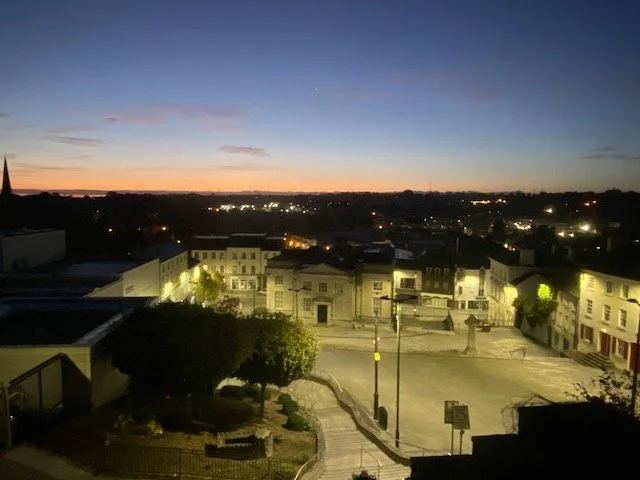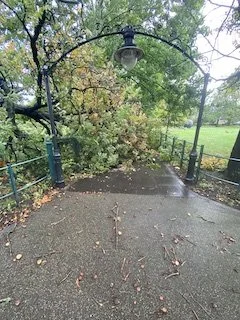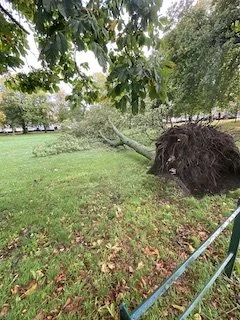September 2025 Round Up
As the first named storm of the Meteorological year blows in (Hi Amy) I thought it as good a time as any to round up what I was reading/watching/listening to in September, with a wee bit of October.
Storm Amy
Definitely not on the level of Storm Éowyn from the beginning of the year but Storm Amy brought a fair bit of havoc to Ireland this past twenty four hours. I was again quite lucky, the electric stayed on and I was in the house so didn’t have to worry about travelling, but plenty are still without power. Due to illness I hadn’t been out of the house for a few days, but when the winds died down this morning I got a walk around the mall. Sadly another few trees gone and a fair amount of branches blocking the paths.
Books
Three Irish authors this month. Eimear Ryan’s ‘The Grass Ceiling’ was a powerful account about being a women in Irish sport, in this case Camogie, and for me joins the list of great Irish sports writing. Part memoir, part cultural commentary, I found this to be a thought provoking read.
Next up was ‘Heart, be at peace’ by Donal Ryan, the follow up to the acclaimed ‘The Spinning Heart’. Is there a better Irish writer operating at the momment? Answers in the comments below please. For me just another wonderful book, full of compassion and quiet revelations.
My audiobook this month was ‘The Northern Bank Job’ by Glenn Patterson.Yes, the details of the bank robbery robbery are fascinating, especially if you aren’t aware of the details, but it’s also a story about the wider post ceasefire North of Ireland, and how the truth is always slightly out of reach.
Comedy
I’ve been laid up with illness, my first virus in a while and it feels like an early seasonal one but there’s a lot of germs flying about. But I managed to make my way to see Dylan Moran in the local theatre. (In fairness it’s but a two minute walk from my apartment to where I take my seat).
I’ve been a fan since his ‘Black book’ days of the early noughties, and have seen him doing stand up on TV. Always enjoyed his rambling, slightly surreal observational style of comedy so was looking forward to this.
Moran came onto a stage with a guitar, whilst there’s a grand piano and small keyboard and assorted random musical instruments in a bag, along with a flipchart on stage. These are all props that he will keep returning to throughout the set, seemingly to help him get into a flow state.
As you’d expect, it’s not a conventional comedy routine of set up and punchline. It’s more a wandering amongst ideas, with lots of digressions, usually ending up far from where he started.
There was a bit of audience interaction when he kept asking about Armagh (quiet) and for me some fairly derivative jokes about the ‘Nordie’ accent. Oddly, he seemed surprised that we aren’t as socially conservative as he seemed to believe. Some observations on the housing crisis in Ireland, mobile phones and he didn’t hold back on the comedians currently selling their souls to Saudi Arabia. But he generally went he wanted to go and the audience were happy to go with him.
I enjoyed it, there were plenty of laughs and it was a good crowd. He did sometimes seem to want a bit more from the audience, and there were times when it felt he’d meandered into a corner but he generally found a funny line in most places.
He sometimes drifted into darker places, and I liked this, especially about his drinking. Definitely an original performer, almost like a poet at times, with a mixture of the bittersweet and the surreal, but mostly hit the spot. Great way to spend a Wednesday evening.
Manchán Magan
Speaking of my local theatre, when I got the recent Autumn programme just last week I noticed that Manchán Magan was touring his latest show. When I went to book a ticket, it said the show had been cancelled, and I then remembered he’d spoken on the Tommy Tiernan show about his prostrate cancer diagnosis.
Sadly I heard on the news this morning that Manchán had passed. Only recently I had mentioned to one of my classmates in my Gaeilge class about his book Thirty Two words for field, which I reviewed back in 2021. A fascinating book about the Irish language and it’s roots in nature, people and animals, it opened my eyes and more importantly my ears, as to how Gaeilge is rooted in the world around me. It’s no exaggeration to say that Manchán had an influence in giving me a grá for the language again and to motivate me to keep going to classes (finally out of bunrang!).
He did a very moving interview on RTE only last week, where he talked about death - sadly it seems he thought he had a bit longer. He always came across as such an erudite, passionate man and I’ve been enjoying his travel documentaries when they’re on TV, and he always spoke so beautifully about his spirituality.
I always took hope in how he talked about how we were at the dawning of a new age, with more interest in the land, a more intuitive way of living. I can’t find the exact clip I wanted, but here he is talking on the Tommy Tiernan show.
Slan Abhaile, a Manchán.
TV
Continuing with the Irish theme, I’ve been watching ‘House of Guinness’ on Netflix. It’s been so hyped that I don’t need to say much about it, but briefly, it’s set primarily in 19th-century Dublin immediately after the death of brewing magnate Sir Benjamin Guinness. It follows the power struggles, ambitions and loyalties of his four adult children — Arthur, Edward, Anne and Ben — as they inherit and contend with the vast Guinness brewing empire.
In the 1860s Ireland was still under British rule, and nationalist movements such as the Fenians (Irish Republican Brotherhood) were agitating for independence or greater autonomy. The Guinness family themselves were part of the Anglo-Irish Protestant elite / Protestant Ascendancy, which held privileged status under British governance—placing them in a delicate position between loyalty to the Crown and tensions with Irish nationalist sentiment.
First the positive bits. It’s good to hear current Irish bands on the soundtrack, everything from Kneecap to Lankum. It’s got a good cast, including Anthony Boyle (excellent in ‘Say Nothing’) and James Norton. Definitely can tell a lot of money has been spent on the production.
Now for the rest.
Firstly the setting. I know it was filmed in Liverpool because of the Victorian/Georgian architecture, and has plenty of warehouses and terraces to match that period. But I never felt it was set in Dublin - there were no landmarks at all, and it had no sense of place.
‘This is a fiction based on true stories’ was the foreword on each episode. What exactly does this mean? I’m not expecting 100% accuracy but from a broader perspective the role of the Anglo Irish role in Irish politics was much more nuanced. They did benefit from land ownership and British political power but they were much more intertwined into Irish life. The Guinnesses were much more complex than depicted, and were major philanthropists rather than scheming power hungry aristocrats depicted here.
I think it was the cliches that annoyed me more than anything. The drunken fenian rebels, brawling at a funeral. Absolutely no attention given to the social and political conditions at the time that were driving the desire for Irish independence, just drunken feckless republicans skulking around in dimly lit taverns (the lighting on this show also wrecked my head - thought something was up with my telly). Their costumes also made them look like leprechauns.
The dialogue also annoyed me, and felt stagey and flat. (Was ‘bonehead’ used a lot back then?) Just clunky and silly at times. The cartoonish Rafferty whispers to Anne, the Guinness heiress; ‘Inside you there’s a black, wild, wild cat, dying to climb up onto the rooftop and howl.’
Bejaysus.
I was never a fan of Peaky blinders, so I didn’t have high hopes for this, but it was more disappointing than I expected. I get that it’s only a TV show and throwaway entertainment but I felt my inner critic shouting almost as soon as it started.
But for me it’s sort of like temple bar, as it will probably be enjoyed by some but best avoided by the rest of us.
The Leftovers
When I’m ill and laid up on the couch, I find that a rewatch tends to be in order; don’t have to use much brainpower, and there’s a comfort in the familiar. I did think about yet another viewing of ‘Madmen’ as it’s always feels like an Autumn show, but instead settled for ‘The leftovers’, which would be a second viewing.
It’s also coming up the pivotal date in the show, October the 14th, when around 2% of the worlds population, around 160 million people, vanished. Just like that - no reason, no pattern, in the middle of their everyday lives.
Over three seasons, the story explores not so much where these people went, but rather the individuals, families, and communities left behind and how they deal with loss, uncertainty, and the collapse of meaning.
I’m enjoying it as much the second time around, as I remember most of the story so I can dwell on some of the questions asked, mostly how do you live with something so inexplicable? You could always join a cult such as the guilty remnants, who believe the world ended that day and refuse to move on and offer constant reminders to others who are living their lives.
Also enjoyable are the performances, such as that from Carrie Coon, who plays one of my favourite characters of recent times, Nora Durst. I’ll watch her in anything. I also like the different layers - it can be a family drama one momment, before moving into a surreal, dreamlike sequence with wonderful momments of absurd black humour. It’s also got a wonderful score from Max Richter, the first time I’d heard his music.
But it’s ultimately at its best when exploring religion, grief and faith, all the time looking at how we all deal differently with loss. It also nails the ending, unlike many shows. Sometimes it’s best to just let the mystery be.
Films
Couple of good ones this month. First up was ‘Drive my car’ by Ryusuke Hamaguchi, adapted from a short story by Haruki Murakami (in his collection Men Without Women).
It’s a quiet, meditative film about a theatre director who moves from Tokyo to Hiroshima after a loss in his life. Again, like above, it’s about grief and there are plenty of silences and reflective momments, especially during long car rides. I found this very moving, about how art and conversation bring people to healing.
Sticking with Japan, ‘Shoplifters’ by Hirokazu Kore-eda is about a poor, makeshift family living on the margins of Tokyo — surviving through odd jobs, petty theft, and deep loyalty to one another. A new arrival disrupts the balance, and we see the consequences play out.
It’s a film that asks ‘what is family?’ (one character is told ‘You can’t be a mother unless you’ve given birth’) and explores the ties that binds us. Is blood really thicker than water?
I liked the intimacy of this film, and it had a warm heart. There’s something gentle and observational about it, and at times it felt like a documentary. Enjoyed this, and the ending crept up on me.
Music
Couple of albums on rotation, ‘Sketches of Spain’ by Miles Davis and ‘A Love Supreme’ by John Coltrane. In that sort of mood I suppose, going back to some Jazz classics. I think I always knew that this is where I’d end up, and I may be here for some time.
I mentioned Mánchan earlier, agus as gaeilge, so this seems like an apt place to finish. In the meantime may you be happy, may you be well, and may you be free from suffering.





